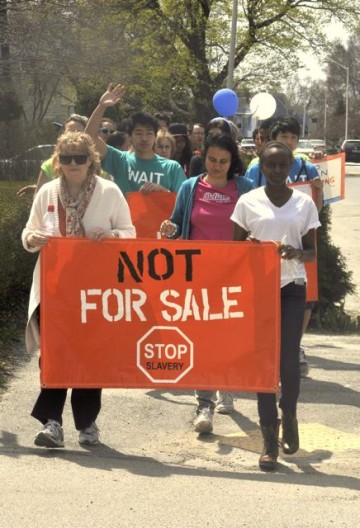First Worcester “Not for Sale Campaign”
Monday, April 29, 2013

Sixty or so people, young, older, and seniors, multi-racial, religious and secular, gathered at the intersection of Lincoln St. and Burncoat Ave. before starting on Worcester’s first Not for Sale Campaign march on Saturday, April 27th, an action to raise awareness of, and encourage involvement in, a growing international and national (36 states) movement to end contemporary human slavery and to assist its victims, estimated at 30 million worldwide.
When people hear the phrase “human trafficking”, images of third world countries and sex exploitation most likely come to mind. Both are appropriate; however, its victims, 50% women and children, originate in and/or are enslaved in many rich developed countries, including Germany, the UK, Japan, and the US as well as in Asian and African countries, and India.
And the victimization extends beyond the sex trade to forced labor and to debt bondage-wherein a loan or service becomes the basis for lifelong servitude, and to suppliers of organs for transplant patients. Forced labor and debt bondage are prevalent in domestic service, agricultural work, janitorial labor, and food services.
This dirty business is highly profitable, estimated as an annually 32 billion dollars global industry that the US participates in both as a provider and customer. The largest victim market here in the US is comprised of between 240,000 and 325,000 youth, mostly girls, 72% between 12 and 14, who are kidnapped, coerced, tricked into prostitution and other forms of sexual exploitation typically on the streets, in massage parlors, at hotels.
For instance, “Eden,” the film directed by Megan Griffith and recently released, tells the story of Chung Kim, a South Korean girl kidnapped in New Mexico and forced into a new “family” of children pimped and beaten by their entrepreneurial owner. The Not for Sale campaign in the US began when organization president, David Batstone, discovered that one of his favorite Indian restaurants near his home in California was using trafficked women from India to cook meals and perform various tasks around the restaurant. One of the women was killed in a gas leak, uncovering the restaurant's trafficking business.
In the tradition of Boston and Worcester, both major hubs of the 19th century Abolitionist Movement, the Worcester march on Saturday was organized by the Central Massachusetts Not For Sale project, founded by Robin Currie one year ago, and it included Worcester Students for Abolition, a Burncoat High School project organized by Robin’s daughter, Christine Currie .In conversation , Robin Currie addressed the importance of understanding the scope of trafficking and enslavement, of thinking about the goods we buy (those that are produced by victims in countries such as Bangladesh), and how we can we rescue those most in need.

For more information about human trafficking and the Central Massachusetts Not for Sale organization, contact [email protected].
Rena Grasso can be reached at [email protected].




 Delivered Free Every
Delivered Free Every
Follow us on Pinterest Google + Facebook Twitter See It Read It